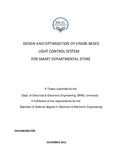| dc.contributor.advisor | Rahman, Md. Mosaddequr | |
| dc.contributor.author | Sen, Shuvashish | |
| dc.date.accessioned | 2014-03-18T03:57:58Z | |
| dc.date.available | 2014-03-18T03:57:58Z | |
| dc.date.copyright | 2013 | |
| dc.date.issued | 2013-12 | |
| dc.identifier.other | ID 10221066 | |
| dc.identifier.uri | http://hdl.handle.net/10361/3046 | |
| dc.description | This thesis report is submitted in partial fulfillment of the requirements for the degree of Bachelor of Science in Electrical and Electronic Engineering, 2013. | en_US |
| dc.description | Cataloged from PDF version of thesis report. | |
| dc.description | Includes bibliographical references (page 48-49). | |
| dc.description.abstract | In our thesis work we explore the various possibilities of enhancing user comfort and operational cost of smart departmental store providing several range of method for maximum utilization of resources. We present a utility-based departmental store that can detect human intervention in every aisle and automatic control system that make adjustments based on conditions such as occupancy, daylight availability assurance as well as ensuring considerable energy saving. The wide array of products and services of departmental store require greater emphasis on maintenance of temperature and humidity and confirming the protection and contamination of the products. Thus the features of stabilizing temperature with the aid of varied sensors help to monitor the betterment of the entire environment. In this modern era, user-centric process of designing and functionality are greatly prioritized for ensuring satisfying user experience in which maximum emphasis is laid for fulfilling the needs, desires and limitation of end users. This paper aims to develop optimization formulation for the benefit of user comfort while reducing the energy cost of lights significantly. The methodology of the paper explores the process of learning human activity and adjusts the light setting in order to provide comfortable environment for the customers while saving energy by turning off unnecessary lights. | en_US |
| dc.description.statementofresponsibility | Shuvashish Sen | |
| dc.format.extent | 50 pages | |
| dc.language.iso | en | en_US |
| dc.publisher | BRAC University | en_US |
| dc.rights | BRAC University thesis are protected by copyright. They may be viewed from this source for any purpose, but reproduction or distribution in any format is prohibited without written permission. | |
| dc.subject | Electrical and electronic engineering | |
| dc.title | Design and optimization of vision based light control system for smart departmental store | en_US |
| dc.type | Thesis | en_US |
| dc.contributor.department | Department of Electrical and Electronic Engineering, BRAC University | |
| dc.description.degree | B. Electrical and Electronic Engineering | |

